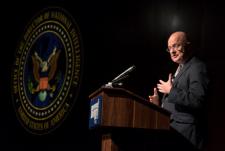Bioterrorism And Gene Editing: Can Crispr Tool Be Used As Biological Weapon In War?
By Himanshu Goenka,
IB Times
| 12. 14. 2016
Crispr is a tool that allows for genes to be edited, and has great potential in the treatment of a wide range of diseases, including some for which there is currently no known cure. It rose to prominence in 2015, when it was chosen as the breakthrough technology of the year by the American Association for the Advancement of Science, and became even better known in 2016 when scientists behind it were strong contenders for the Nobel Prize (which it finally didn’t win) and also appeared in Time magazine’s readers’ poll for the Person of the Year title.
Even as a legal battle is currently underway for the patent rights to Crispr (its Cas9 variant, to be specific), the technology is far from perfect right now — scientists are still working on making it more precise and the first human test involving a gene modified using Crispr took place only in October. And yet, it has made it to the list put together by U.S. intelligence agencies on national security threats.
However, in a somewhat surprising announcement in February 2016...
Related Articles
By Steve Rose, The Guardian | 01.28.2026
Ed Zitron, EZPR.com; Experience Summit stage;
Web Summit 2024 via Wikipedia Commons licensed under CC by 2.0
If some time in an entirely possible future they come to make a movie about “how the AI bubble burst”, Ed Zitron will...
By Arthur Lazarus, MedPage Today | 01.23.2026
A growing body of contemporary research and reporting exposes how old ideas can find new life when repurposed within modern systems of medicine, technology, and public policy. Over the last decade, several trends have converged:
- The rise of polygenic scoring...
By Daphne O. Martschenko and Julia E. H. Brown, Hastings Bioethics Forum | 01.14.2026
There is growing concern that falling fertility rates will lead to economic and demographic catastrophe. The social and political movement known as pronatalism looks to combat depopulation by encouraging people to have as many children as possible. But not just...
By Josie Ensor, The Times | 12.09.2025
A fertility start-up that promises to screen embryos to give would-be parents their “best baby” has come under fire for a “misuse of science”.
Nucleus Genomics describes its mission as “IVF for genetic optimisation”, offering advanced embryo testing that allows...




